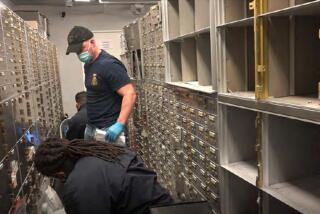Drexel ‘Junk Bond’ Unit Reportedly to Stay in Southland
- Share via
NEW YORK — The Securities and Exchange Commission will permit Drexel Burnham Lambert’s highly profitable “junk bond” department to remain in Beverly Hills under terms of a settlement likely to be made public soon, sources close to the negotiations said Tuesday.
In talks on settling pending SEC charges of fraud, insider trading and stock market manipulation, the agency had demanded that Drexel move the high-yield junk bond operation back to the firm’s headquarters in New York, where SEC officials felt it could be more closely supervised.
But Drexel strongly resisted, claiming that closure of the office would be catastrophic to the firm’s business. Officials said they feared an exodus of key employees who were reluctant to move. The junk bond department, headed by Michael Milken, has been the direct or indirect source of most of Drexel’s profits. Its activities also have been the source of nearly all of the firm’s legal problems with federal regulators and the U.S. Attorney’s Office in Manhattan.
The threat of being forced to close the Beverly Hills office prompted Drexel in January to mount a lobbying campaign with Los Angeles city officials and congressmen from California. Both of California’s senators and seven representatives wrote to SEC Chairman David S. Ruder asking that Drexel be permitted to keep the office open.
Terms of the settlement, however, were worked out with the SEC’s enforcement staff. Ruder and the other commissioners are believed not to have officially considered it yet, and it isn’t known if they played any role in shaping it. The commissioners must formally approve the settlement before it becomes official.
The Beverly Hills office was founded by Milken in 1978. He had almost single-handedly developed Drexel’s hugely profitable junk bond business in New York and then won approval to move the department to his native Los Angeles. The junk bond operation has been a major force in financing hostile corporate raids and leveraged buyouts. Although the department nominally was under control from New York, Milken in actuality was allowed much independence.
The accord would end the SEC’s lawsuit, which has been pending against Drexel since September. It also would clear the way for Drexel to carry out its announced agreement with federal prosecutors in New York to plead guilty to six criminal counts and pay $650 million in penalties. Under that agreement, Drexel is also supposed to fire Milken and deprive him of his 1988 bonus. But that provision is being challenged in court by Milken’s lawyers. Milken, who denies any wrongdoing, is still expected to be indicted on a variety of securities fraud and racketeering charges.
Although the core of the junk bond operation will remain in Beverly Hills, the agreement will, as expected, require Drexel to move some peripheral operations back to New York, sources said. These include trading in convertible securities and the limited trading in stocks carried out by the high-yield department.
Although the junk bond operation will remain where it is, the Beverly Hills office will be subject to much closer scrutiny under provisions of the tentative settlement, the sources said. The firm will be required to name at least two outside directors to its 22-member board, and it will pay for the services of a Philadelphia-based law firm, Morgan, Lewis & Bockius, selected by the SEC, to closely review Drexel’s compliance with securities laws.
It is understood that one reason the firm was selected is that it has offices in Los Angeles as well as in New York. A member of the law firm’s management committee noted that the SEC commissioners hadn’t taken final action on the settlement yet and so declined to comment on reports that his firm had been selected to monitor Drexel’s compliance.
The Morgan Lewis firm has been retained before to conduct this type of monitoring for the SEC. It was hired in 1987 to review procedures at Los Angeles-based Jefferies & Co., a brokerage firm, after its founder and chief executive, Boyd L. Jefferies, pleaded guilty to securities fraud charges. The law firm found no major problems at Jefferies. But some congressmen and others at the time criticized the selection of Morgan Lewis because the firm had been Jefferies & Co.’s outside counsel while Boyd Jefferies carried out his illegal activities.
Morgan Lewis, however, doesn’t represent Drexel. And a source said the SEC is likely to require a much more extensive review of Drexel than it required of Jefferies & Co.
More to Read
Inside the business of entertainment
The Wide Shot brings you news, analysis and insights on everything from streaming wars to production — and what it all means for the future.
You may occasionally receive promotional content from the Los Angeles Times.









